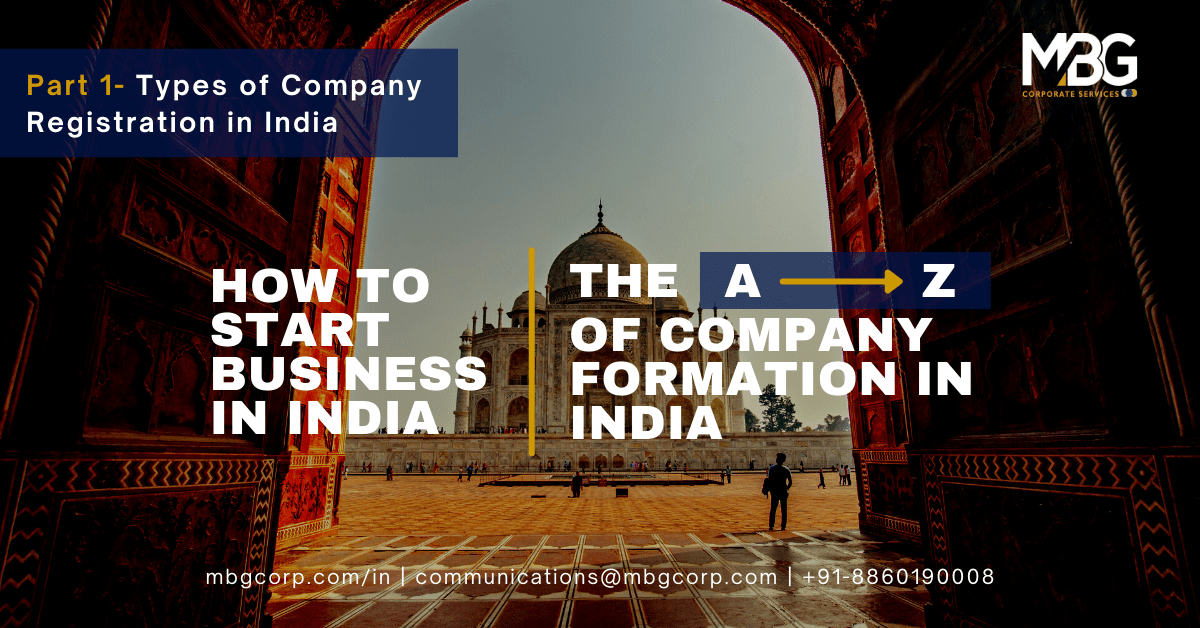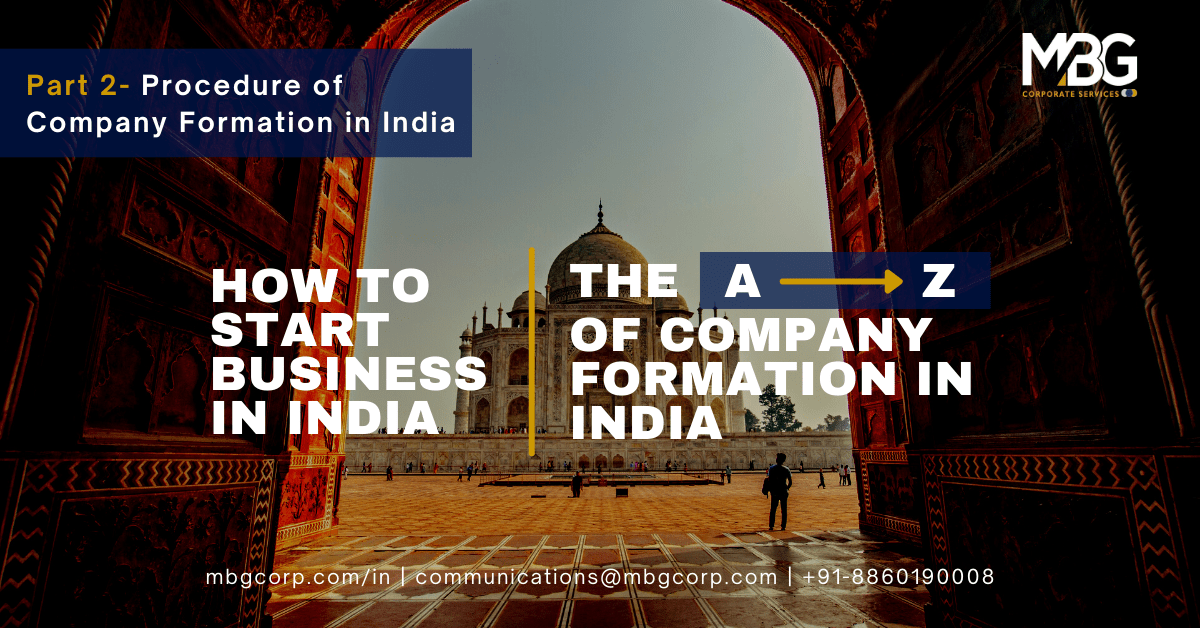How to Start Business in India: The A-Z of Company Formation in India-Part 1
September 24, 2021

Part 1. Types of company registration in India
At MBG Corporate Services - a leading Market Entry Consulting Firm for business setup in India – we bring you this comprehensive, in-depth two-part series on how to start a business in India vis-à-vis the process of company formation in India. In Part 1, we look briefly at the reasons why a Business Setup in India makes such a compelling case and then cover in detail the available options and types of Company Registration in India. Part 2 will cover the company registration in India process.
Business Setup in India: Why you should invest in India
At over USD 60 Billion, India was the fifth largest FDI recipient in the world in FY 2020. That was an increase of 27% over 2019. These UN numbers reflect the huge surge in Business Setup in India. More and more companies around the world are interested in how to start a business in India. The ‘why’s are well known. Here are five of many reasons for a business setup in India:
- Size, scale, and growth: India is the fifth largest economy in the world. It is home to 400 million plus middle-class consumers and a nearly 500 million-strong labor force. It is also amongst the fastest growing economies, with 5%+ p.a. GDP growth over 2010-2020.
- Political stability: Beyond the economics which alone places India in the recommendation lists of market entry consulting services firms, India is a free and vibrant democracy blessed with peace and political stability, the cornerstone of any market entry strategy.
- Strong institutions and systems: India’s economic and legal institutions are strong and well entrenched, protecting both business and citizen interests. The economy is powered by a robust financial system with free markets, liberal interest rate and exchange rate regimes, and the fifth largest Forex reserves in the world – over $600 billion in June 2021.
- Investment-friendly vision: Fast-improving ease of doing business is a core driver. Governments have changed over the last 30 years but the commitment to economic liberalization and reforms has continued to grow. While the Ease of Doing Business ranking is still low, India jumped 79 places in five years to 63rd rank in 2020. Company formation in India is now significantly easier. Information on how to start a business in India is also more organized and accessible.
- Strong infrastructure: Another key market entry strategy component, India has a large, well-established, and diversified manufacturing base and massive industrial and logistics infrastructure developing along a high-priority growth path.
- Knowledge-Economy powerhouse: India is one of the leaders of the global digital revolution with a highly developed ICT sector, a critical driver both of the modern global economy and global companies’ India market entry strategy.
Company incorporation in India is governed under the provisions of The Companies Act 2013 (Companies Act). There are various options for company formation in India. The following are the available types of company registration in India :
(A)- Company registration in India for Indian nationals
There are many types of company registration in India for Indian nationals. The following are the key types of company incorporation in India:
1- Private Limited Company :A private limited company is a separate legal entity independent from its shareholders with limited liability and whose shares cannot be publicly traded. “Private Limited” must be mentioned with the company’s name. Shareholders must number between a minimum of two and a maximum of 200. Private limited company formation in India requires at least two directors for registration, each of whom must have a director identification number (DIN) issued by the Ministry of Corporate Affairs (MCA). One director must reside for at least 182 days during a financial year (i.e. 1st April to 31st March) in India. While a private limited company has the disadvantage of not being able to raise funds by a public listing of their shares, they enjoy several advantages such as:
- Legal entity: A private limited company is an independent legal entity that can carry out business, own property, and take on debt in its own name and responsibility.
- Limited liability: The liability of a shareholder is limited to the value of their investment in the company’s shares, a fundamental premise of private limited company formation in India
- Perpetual succession: This means even if a member dies, leaves, or is removed, the company continues to exist. Its identity remains intact even if there is a management change.
- Fewer formalities: Pvt ltd. company registration in India, as well as its operations and administration, requires fewer formalities and disclosures than a public company.
Private Limited company formation in India is the most common type of formation for foreign entities setting up in India (see below)
2- Public Limited Company :Like private limited companies, public limited companies to are separate legal entities, but unlike private limited companies, their shares can be listed and traded publicly on the stock exchange. Public limited companies, once listed on a stock exchange in India, must comply with the laws, regulations, and guidelines of the Securities and Exchange Board of India (SEBI) which regulates the stock markets in India. Company formation in India procedure stipulates no maximum limit on the number of shareholders for a public limited company but requires it to have a minimum of seven shareholders. Public limited company registration in India requires at least three directors, with at least one of them being Indian residents, just as it is with Pvt ltd company registration in India.
The advantages of a public limited company include:
- A legal entity, Limited liability, Perpetual succession: Like private limited companies, public limited companies too are independent legal entities with the limited liability of shareholders and carry on irrespective of the presence of individual shareholders or members.
- Ability to raise funds from the public: Being allowed to list their shares on the stock exchange, public limited companies have wider access to funding. It is also easier for them to raise debt funds through instruments like debentures and public deposits.
Some of the disadvantages include:
- Legal requirements, and compliances: There are more legal and regulatory compliances required for public companies with more extensive and stringent corporate governance mandates. Apart from the standard company law compliances, they must also comply with SEBI requirements whenever they are publicly listed.
- Subject to capital market fluctuations: As listed shares are traded on a daily basis, the capitalization of public limited companies can fluctuate due to extraneous factors beyond their control.
A Person Company is a separate legal entity with limited liability but with only one shareholder owning, managing, and controlling it. The person must be an Indian resident with a stay requirement of only 120 days (earlier 182 days) during an immediately preceding financial year.
The advantages include separate legal status and limited liability, low cost and simple setup, and direct control and sole profit for the owner.
The disadvantages are as under:
- Limited business scope
- Such Company cannot be converted into a Company under Section 8 i.e. as a Non-profit Company;
- Such a Company cannot carry out Non-Banking Financial Investment activities including investment in securities of anybody corporate.
(B) Business setup in India for foreigners
A foreign entity can have a business setup in India either as an Indian company or as a foreign company with a place of business in India.
1- Foreign company registration in India as an Indian companyA foreign entity can have company incorporation in India either as a Wholly Owned Subsidiary with 100% foreign ownership or through a Joint Venture (JV) with an Indian entity. In either case, the foreign entity’s company incorporation in India could be as a public or a private limited company; however, a private limited company is the most popular type of company registration in India for foreign entities.
Mergers and acquisitions (M&As) with an Indian company is also an option for business setup in India. They enable a foreign company to enter the market with experienced domestic partners with compliances fully or mostly in place and with immediate access to established brands and product lines, customers, distributors, suppliers, employees, and other resources. Economies of scale can be realized with a bigger size.
On the other hand, company registration in India with M&As also entails regulatory procedures and guidelines to be followed. For acquisitions, there is a minimum floor price at which shares can be bought, which would depend on the fair value of shares as computed by the Chartered Accountant or Category-I Merchant Banker. And mergers must comply with the Foreign Exchange Management (Cross Border Merger) Regulations 2018 and be approved by the National Company Law Tribunal (NCLT) and other relevant sector-specific competent authorities as may be applicable
2- Foreign entity business setup in India with an officeForeign entities can also have the following types of establishments or arrangements in India:
- Liaison Office (LO): A representative office for communication between the foreign parent company and parties in India. It has no separate legal standing, it is an extension of the head office. The foreign entity, in order to be eligible, must have a minimum net worth of US$ 50,000 and must have recorded profits in the past three years in its home country. As a legal non-entity, a liaison office has simple and minimal compliance requirements. However, its scope of work is limited, and it cannot earn an income.
- Branch Office (BO): Like liaison offices, a branch office too is a foreign parent’s head office extension without its own legal standing but, unlike liaison offices, it has a right to undertake business and to accrue income. A branch office requires the foreign entity to have a net worth of over US$ 100,000 with recorded profit in the last five years in its home country.
- Project Office (PO): It is different from a branch office or a Liaison office. A Project office is set up for the execution of a specific project for which the foreign entity has a contract from an Indian company to execute it in India. Its funding must be by remittances from abroad or secured through an international financing agency or load from an Indian public financial institution or bank. However, if these conditions are not fulfilled, prior permission from the Reserve Bank of India would be required to be sought.
For more information, please email us with your specific business requirements at [email protected]
or contact us at +91 88601-90008
Also Read:- Procedure for Foreign Company Registration in India









